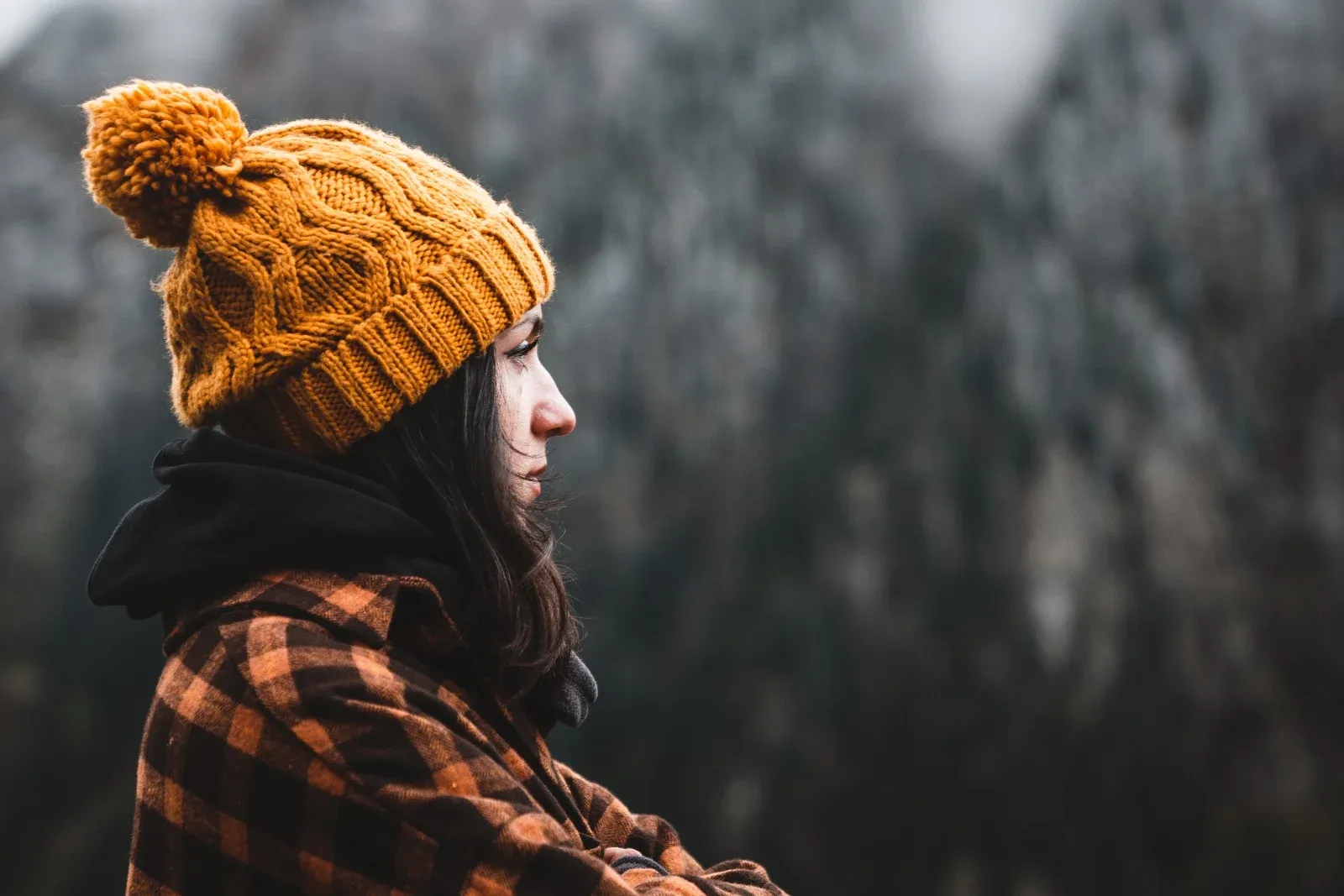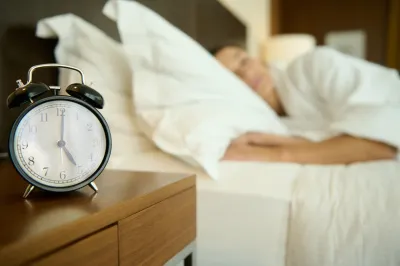
Key Takeaways
Winter changes your light exposure, activity levels, and internal clock, which can quietly impact sleep and daytime energy.
- Shorter daylight hours can increase melatonin production, making mornings feel heavier and slowing your natural wake cycle.
- Lower vitamin D levels and less time outdoors are linked to increased daytime fatigue during winter months.
- Seasonal Affective Disorder (SAD) can affect mood, energy, and sleep timing as daylight decreases.
- Cold weather often leads to less daily movement, which can reduce sleep quality and limit restorative deep sleep.
- Seasonal shifts in diet and circadian rhythm can place additional strain on energy levels and sleep consistency.
- Simple habits like morning light exposure, consistent sleep timing, gentle daily movement, staying hydrated, and addressing vitamin D can help support better sleep through winter.
You may be asking yourself more often: Why Do I Sleep More in the Winter? Well, it's a serious question, and it's something you're not imagining: seasonal fatigue is a real phenomenon. As daylight hours shrink and temperatures drop, your body's circadian rhythm is naturally disrupted, leading to increased melatonin production.
Many people sleep longer. They still feel sluggish during the day. Daylight fades and temperatures drop. This change is biological, not just a mood shift.
We explain the science of environmental, hormonal, and psychological factors (including a look at SAD) that explain why you sleep more in the winter due to reduced sun exposure —and offer a few actionable steps that not only work, but can help you fight the seasonal slump.
Improve Sleep Quality During the Winter Months
Seasonal fatigue makes quality sleep harder to maintain. The Chilipad provides precise temperature control that supports deeper, uninterrupted rest — even when winter throws off your rhythm.
Sunlight and Melatonin
Your body follows a circadian rhythm — your body’s 24-hour internal clock that regulates sleep, wakefulness, mood, and energy based on light cues. This clock depends on light. When sunlight is limited, your internal rhythm gets mixed up.
Light tells your brain to stop producing melatonin, which is the hormone your brain releases in darkness to help signal that it’s time to sleep. In winter, dark mornings keep melatonin levels high for longer. That’s why you feel groggy and slow to wake up.
A 2019 study showed that melatonin stays elevated later into the morning during winter. [1] This helps explain why waking up can feel harder than usual.
Not Getting Enough Sunshine (and Vitamin D)
Sunlight plays a key role in vitamin D production, which supports mood, alertness, and daytime energy. Because people spend less time outdoors during winter, vitamin D levels often decrease—an issue linked to increased fatigue and changes in sleep timing.
Research in 2020 suggested that Vitamin D plays a supportive role in melatonin regulation as well. If you're feeling persistently tired, discussing blood testing or supplementation with your provider can be helpful. [2]

Winter Blues: Seasonal Affective Disorder (SAD)
Seasonal Affective Disorder is a form of depression triggered by reduced daylight, often causing low mood, fatigue, and changes in sleep patterns during winter. It can impact motivation, mood, and energy—and it often impact your mental health.
One study found that people experiencing SAD slept an average of 2.7 additional hours during winter months, showing how dramatically the season can influence sleep and how important it is to combat winter fatigue. [3]
Symptoms can include low energy, oversleeping, increased appetite, and a heavier emotional tone. Light therapy, structured routines, and more daylight exposure can make a significant difference.
Did you know? Millions of people use light therapy (SAD lamps) each winter to ease the “winter blues.” SAD affects about 1 in 20 adults, and many others experience milder symptoms, provided by Cleveland Clinic. [4]
Cold Weather Makes You Less Active
The cold temperatures of winter can also contribute to increased tiredness. When it’s freezing outside, a warm cup of hot cocoa sounds much more appealing than going for a walk. We tend to stay indoors and move less, but this sedentary lifestyle reduces our sleep quality, highlighting the need to practice good sleep hygiene. , resulting in lower energy and a greater desire for sleep.
Engaging in regular exercise is important for maintaining energy and supporting a stable mood, but the winter cold can make outdoor workouts difficult. If you don’t have access to a gym, simple at-home options work well, too. You just want to get involed in some form of physical activity.
Less movement means:
- Fewer natural energy spikes
- Less pressure to sleep at night
- More daytime sluggishness
You can try light stretching, yoga flows, bodyweight exercises, short indoor walks, or following a free online workout. Even small bursts of movement can help you feel more awake and improve your sleep at night.
Changes to Your Diet
Winter often brings about changes in what we eat. We tend to crave heavier, carbohydrate-rich meals during the colder months—think large pasta dishes, creamy soups, or rich desserts.
While these foods offer comfort, they can cause sharp fluctuations in your energy levels. A diet lacking in essential nutrients, or one dominated by processed carbs, can contribute significantly to overall winter tiredness.
So, how do you fight back against this winter sluggishness? By focusing on a balanced diet rich in fresh vitamins and minerals. Not all carb-rich meals are bad, but keep an eye on those heavy processed ones.
Circadian Rhythm Disruptions
Your circadian rhythm depends on light to stay in sync. Short winter days and increased artificial light can confuse this internal clock. When that happens, your sleep schedule starts to drift.
Many people go to bed later, wake up later, or struggle to feel tired at the right time. This shift can lead to restless nights and lower energy during the day.
You may experience:
- Later bedtimes
- Trouble winding down
- Difficulty waking up
- Restless or fragmented sleep
How Winter Impacts Deep Sleep, REM Sleep, and Light Sleep
Your sleep stages shift throughout the year, and winter can subtly influence each one:
- Deep Sleep: Colder temperatures can support deep sleep, but reduced activity levels may limit how easily your body transitions into these restorative stages. Find out how you can naturally improve your deep sleep.
- REM Sleep: Mood changes during winter, especially those linked to SAD, can affect REM sleep—the stage tied to emotional processing and memory.
- Light Sleep: Increased melatonin can cause longer stretches of light sleep, which may leave you feeling less refreshed, even with adequate total sleep time.
Understanding how these stages shift helps explain why you feel tired in the winter months, making you feel like you’re sleeping more.
Tip: Our Chilipad Dock Pro offers a warm awake mode. This also helps with replacing the jarring alarm clock sounds with gentle warming that triggers your body’s natural wake response.
Simple Winter Sleeping Tips
We weren’t just going to tell you why you feel more tired in winter without giving you something helpful to try. These quick, simple habits can make a real difference—pick a few and see what works for you:
- Get Morning Light: Open your blinds or step outside soon after waking. Natural light helps slow melatonin production.
- Keep Moving: Gentle daily activity, even for a few minutes, supports deeper sleep and better daytime energy.
- Check Your Vitamin D: If you feel persistently tired, ask your provider about testing. Only supplement under medical guidance.
- Stay Consistent: Keep a steady sleep schedule, even on weekends. A regular rhythm supports easier mornings.
- Brighten Your Mornings: Sit near a window or use a light therapy lamp to give your energy a lift.
- Stay Hydrated: Mild dehydration can increase fatigue, especially in winter when people drink less water.
Common Questions People Ask About Winter Sleep
Why do I sleep more in winter?
Shorter daylight hours increase melatonin, colder temperatures change activity levels, and vitamin D often drops. Together, these shifts disrupt your circadian rhythm and create seasonal fatigue, affecting your sleep habits. , making you sleep longer and feel more tired during winter.
Does cold weather really make you feel sleepier?
Yes. Your body uses additional energy to stay warm, and lower activity levels during cold months can make you feel more tired throughout the day.
Can winter affect my deep sleep and REM sleep?
Winter can influence both. Lower activity levels may limit deep sleep, and mood changes connected to reduced sunlight can affect REM sleep, making a light box a helpful tool
How do I stop feeling tired all winter?
Increase natural light exposure, (this can include natural sunlight) add daily movement, keep a steady sleep schedule, and maintain a comfortable sleep temperature.
Peer-Reviewed Research References
-
Danilenko, K.V., et al.
Summer–Winter Difference in 24-Hour Melatonin Rhythms in Subjects on a Five-Workday Schedule in Siberia.
Physiology & Behavior, 2019.
Study Type: Circadian Rhythm Observational Study
Key Finding: Found significant seasonal differences in melatonin timing and duration, with longer melatonin secretion during winter months, highlighting how reduced daylight exposure alters circadian biology.
View Study
Source URL: https://pubmed.ncbi.nlm.nih.gov/31626888/
-
Romano, F., et al.
Vitamin D and Sleep Regulation: Is There a Role for Vitamin D?
Current Pharmaceutical Design, 2020.
Study Type: Clinical Review
Key Finding: Reviews evidence linking vitamin D levels to sleep duration, sleep quality, and circadian regulation, suggesting deficiency may contribute to sleep disturbances.
View Study
Source URL: https://pubmed.ncbi.nlm.nih.gov/32156230/
-
Anderson, J.L., et al.
Sleep in Fall/Winter Seasonal Affective Disorder: Effects of Light and Changing Seasons.
Journal of Psychosomatic Research, 1994.
Study Type: Clinical Sleep Study
Key Finding: Demonstrated that individuals with seasonal affective disorder experience disrupted sleep patterns during fall and winter, with light exposure playing a key role in symptom severity and sleep regulation.
View Study
Source URL: https://pubmed.ncbi.nlm.nih.gov/8064650/
-
Cleveland Clinic.
Seasonal Depression (Seasonal Affective Disorder).
Cleveland Clinic, 2022.
Source Type: Medical Authority Overview
Key Insight: Explains symptoms, causes, and treatment options for seasonal affective disorder, including the role of reduced daylight exposure in mood changes, sleep disruption, and fatigue.
View Resource
Source URL: https://my.clevelandclinic.org/health/diseases/9293-seasonal-depression









